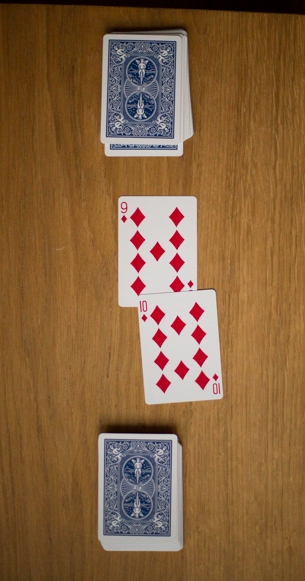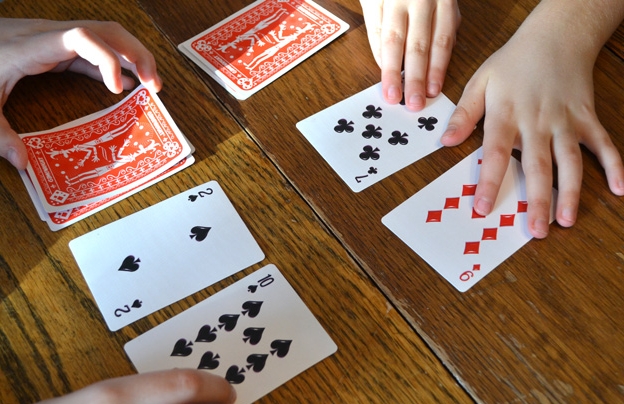War (and variants)
Players: 2
Ages: Depends on the variant
Cost: Free! Just get a deck of cards
Math Ideas: addition, subtraction, multiplication
Questions to Ask:
Who won this round? How do you know?
What are the best cards to draw in this game? Why?
Can you tell who won without counting? How?
My greatest parenting regret is that I taught my son how to play War.
Don't get me wrong, he loves the game. In fact, that's precisely the problem. For weeks after I taught him the rules, War was the only game he let us play, and it got old fast.
If you haven't played War, it's a ridiculously simple card game. You deal the whole deck out to two players, and then both players flip over the top card. Highest card wins. If the cards are the same rank, both players put three cards face down and then flip over the fourth card. Again, the highest card wins the whole pile. The game continues until one person has all the cards.
The game is entirely driven by luck, and it can drag on for twenty or thirty minutes as one player, deck spilling over with forty-something cards, tries to win those last few pesky cards from their opponent.
To stave off the boredom, I started looking up some variants on War. As it turns out, some of these are really fun! Most importantly, they create opportunities for you and your kid to have a little math talk while playing.
Addition War
To play Addition War, split the deck between the players. Then each player places their top two cards face-up on the table. Each player adds their cards, and the player with the higher sum wins all four cards!
In this game, and in all these variants, I typically consider an ace to be 1, a jack to be 11, a queen to be 12, and a king to be 13. If your child has trouble adding two-digit numbers, you can always remove the face cards and play with the numbers from 1-10.
The game seems pretty similar to regular War, right? But this variant provides a great chance to talk math as you and your child discuss who won each round, and how they know.
Your child will probably get tired of adding up each side's cards to determine the winner, time and time again. She will start looking for shortcuts. This is great! Those shortcuts are all part of her growing sense of mathematical reasoning.
For example, my son once played a 4 and an 8, while I played a 2 and a 5. He said that he won, since the 4 was bigger than my 2 and his 8 was bigger than my 5.
In another case, he played a 10 and a 2, while I played a 9 and a 7. He claimed that he had won because his 10 was the highest card, beating both my 9 and my 7.
In the first case, his reasoning was correct, and in the second case, he was off. But both cases are great examples of how games can induce kids to think mathematically.
In both situations, I kept a poker face and asked my favorite question: How do you know? Through his explanations, J was able to find his error in reasoning and explain why it didn't work.
I don't force my son to do the full addition every time, because that would get boring and he would lose interest. Instead, I let him find his own shortcuts along the way, comfortable that we can always use addition to check our work by adding the numbers together afterward.
Subtraction War
This game uses the same rules as Addition War, except you always subtract your smaller card's value from your larger card.
I like this variant the best, actually, because the "good cards" change each round. Sure, a 10 might be a good card when paired with a 2, but it's a pretty lousy card when paired with a 9.
This allows you to pose your child the question: Which cards are the best in this game?
Kids are always looking for the best cards in a card game. In regular war, a king is always a good card, and kids love to celebrate whenever they gain a new one.
But in Subtraction War, there isn't an easy answer to this question. It depends, and your follow-up questions can help your child see this. You could each play one of your cards and then ask "What do you hope your other card will be? Why?" Or one player could play both their cards, and then you could subtract them and talk about what combinations of cards could beat that pair.
I don't try to have these conversations every round, by the way. I just look for opportunities and interesting card combinations that my son and I can discuss. After all, I want him to stay interested in the game, and the second it begins to feel like a Math Lesson, I know I'm going to lose him.
Multiplication War
Can you guess? It's just like Addition and Subtraction War, except with multiplication!
This variant is not my favorite, mostly because I think there are so many other fun ways to explore multiplication through games and puzzles. Still, lots of kids need repeated practice to learn their multiplication tables, and they might be more likely to practice if you can turn that practice into a game.
Again, you can find ways to have interesting mathematical conversations by playing out some of the cards and then discussing the situation. "Ok, I have played a 5 and a 6. You've played a 7 so far. How large does your next card need to be?"
These questions get your child to run through many multiplication facts as they seek out the answer. The difference is, your child will likely feel motivated by their desire to win the game. You'll certainly get more interest than if you asked them out of the blue "What numbers, multiplied by 7, are greater than 5x6?"
The one thing all three variants have in common is that they provoke mathematical discussion, if you find those little moments between the steps of the game. Oh, also they're way more interesting than the plain old boring version.






